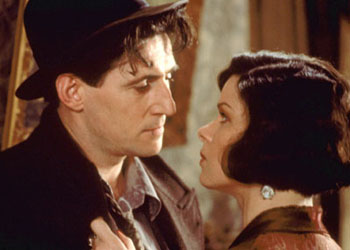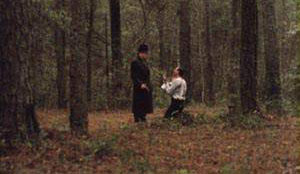|
Words fail me when attempting to describe the awesomeness that is this, my all-time, bar-none favorite film. Therefore, I shall instead present my views by barking like a seal. Ooh! Augh! Aoogh! Ouf! Ough! Auogh! Oof! Aowf! Auf! (Balances ball on nose.) Now do you see why this film rocks this and every other world? No? Well, crap. Back to language, I guess.  Miller's Crossing is the Coen brothers' crowning achievement, which they've yet to surpass or attain again despite a long list of excellent subsequent films. Filmed in 1990 and in glorious color, it's still probably the best film noir ever made. It's more convoluted (barely) than The Big Sleep, more cynical than The Third Man, and a lot funnier than Double Indemnity, which wasn't trying for humor, but you get my point. Inspired in great part by the twice-filmed Dashiell Hammett novel The Glass Key, it definitely has its roots in the meat of the genre, but make no mistake: Miller's Crossing is no rehash of tired material. It brilliantly reinvents the gangster drama while nevertheless remaining altogether more "Hammettian" in tone than the 1942 Stuart Heisler Glass Key with Alan Ladd and Veronica Lake, which, despite being pretty faithful to the book in terms of events, tried to wrench a happy ending out of a story that wasn't at all geared towards having one. Miller's Crossing keeps the ending every bit as cynical and bitter as its source material, if not even a touch more so. The film's greatest debt to the novel lies in its two protagonists, Tom and Leo, who are pretty much directly cribbed from The Glass Key's Ned Beaumont and Paul Madvig. There's also some similarity in the up-and-coming underboss and his brutish lieutenant who try to steer Tom/Ned away from Leo/Paul, and tension between the two men over a mutually sought dame (there's always a dame,) but in terms of the actual plot progression, there's very little similarity. The main source of friction in Miller's Crossing, a no-good chisling grifter of a bookie named Bernie Bernbaum, is an utterly insignificant character in the book, and never even appears after chapter two. In contrast, Bernie outright steals the show in Miller's Crossing every time he's on screen, a fact due as much to John Turturro's Oscar-worthy performance as to the screenplay. Underboss Shad O'Rory, who mostly existed in the novel as a simple source of antagonism to the "good guys," is reborn in the Coens' story as a blustery, short-tempered Italian rival to the Irish-mob dominated city, a man who, in between fixing sporting events and planning to have his enemies bumped off, pontificates at length and with total sincerity about the importance of ethics, which would almost seem comical were it not for the fact that he probably is the most ethical character in the film. It's a brave filmmaker that dares to state the point of the film in the very first line of dialogue spoken, and this is where the Coens do Hammett one better. The style and ambiance are undeniably born from the hard-boiled detective novel, but they also don't forget that their characters are also people, and not just archetypes. The Coens' gangster world is still filled with cold-hearted self-servers who dispense casual cruelty to one another, but it's balanced with the kind of natural emotional response we expect from average Joes, as well. Bernie Bernbaum, who truly is everything bad he's said to be, attains more audience sympathy than any other character when he begs for his life like a frightened child. J. E. Freeman as "The Dane," whose book equivalant was basically just dumb hired muscle, is realized here as Tom's virtual mirror: the brains behind the boss, the man who knows all the angles and who trusts no one. He's also probably the scariest gay man to ever appear in film, as his relentless pursuit of Tom and Leo is motivated not just by loyalty to his boss, but by love for his boyfriend Mink, a small-time bookie with suspicious links to Bernie. And it's impossible not to like Jon Polito's Johnny Caspar, Leo's rival for control of the town and a career criminal with an actual code of honor that compels him to keep his bargains and be straight with people in his dealings, despite a hair-trigger temper that seems to be always teetering on the point of bursting all the blood vessels in his forehead.  Nevertheless, it's Gabriel Byrne as Tom Reagan who commands this film from front to back with his flawless performance as that most rare of character types: the cynical idealist. Halfway through the film, he tells of a dream wherein his hat was blown away on the wind, remarking "There's nothing more foolish than a man chasing his hat." Despite this, he's chasing his hat throughout most of the picture in one way or another anyway, and is still clinging to it in the final moments, as if it were the cornerstone of his identity, or at least the one part he could still be sure of. His fervently espoused notion of avoiding a bloodbath at the cost of one man's life becomes conflicted when the gun's in his own hand, and his strenuous attempts to cling to his old self and still resolve the escalating conflict take him down some very dark and unfriendly paths, where it becomes plain that he can't keep it all; it merely becomes a matter of what he's willing to chase, and what he's willing to let the wind bear away. At its most fundamental level, Miller's Crossing is all about ethics and the politics of right and wrong in trying situations. The fact that every single character is a criminal of some sort doesn't alter the fact that we're watching a heartfelt rumination on where the lines are drawn when it comes to behaving as a decent human being. Looking back up at it, it seems I was wrong about words failing me, though it's still unquestionably true that the words do this film no justice. I can only say see it, and then shortly see it again, as the twisting plot lines may be hard to follow on the first viewing. Watch it, and then still try and tell me with a straight face that The Matrix or Contact are smart movies. I double-dog dare you. Films can often be entertaining, but it's rare that they're flat-out awesome. -review by Matt Murray
|
|
||||||||